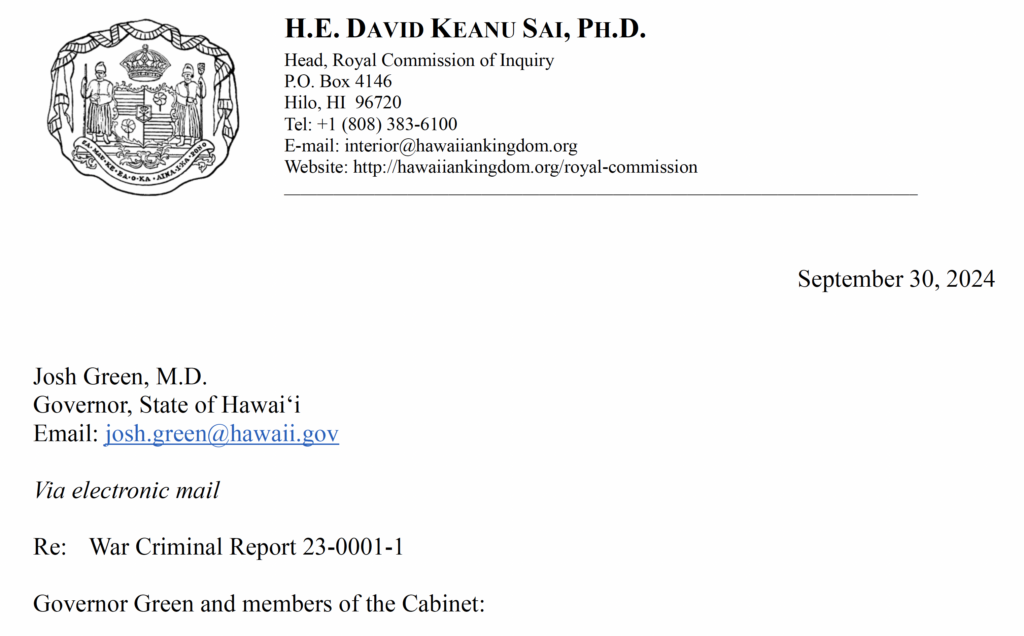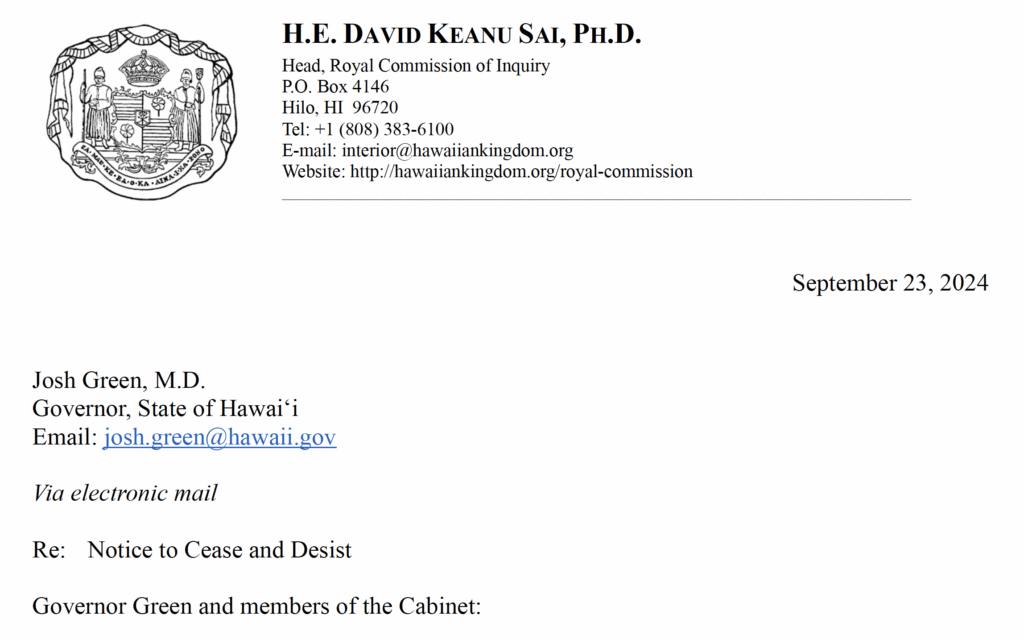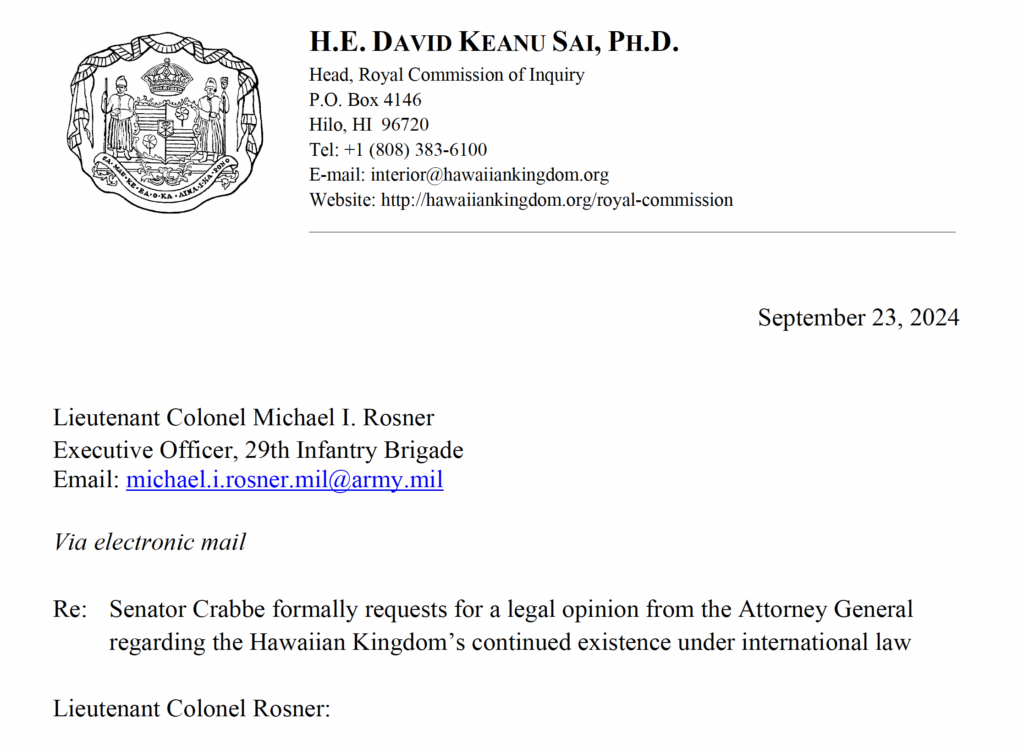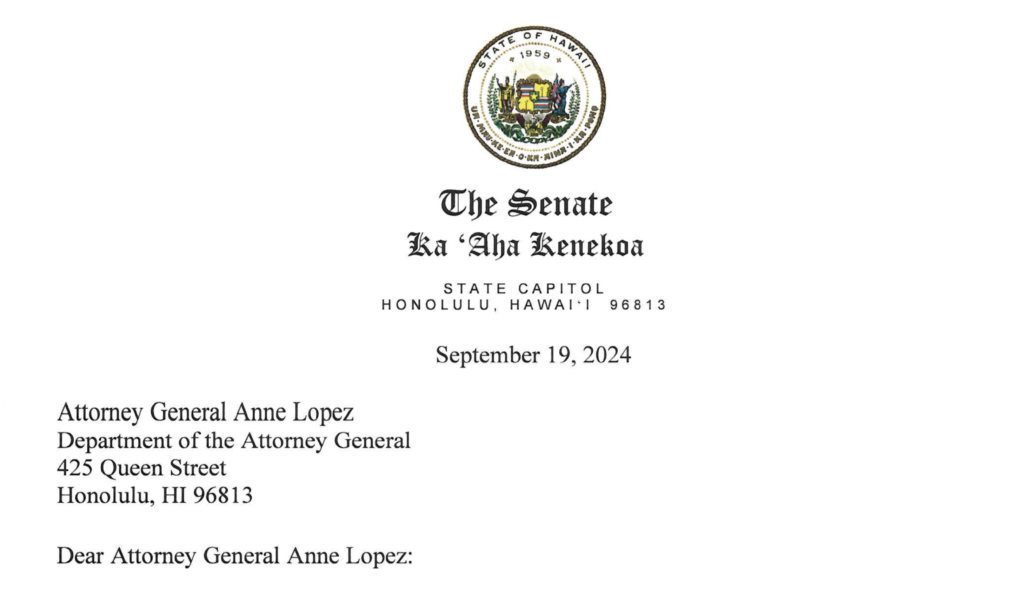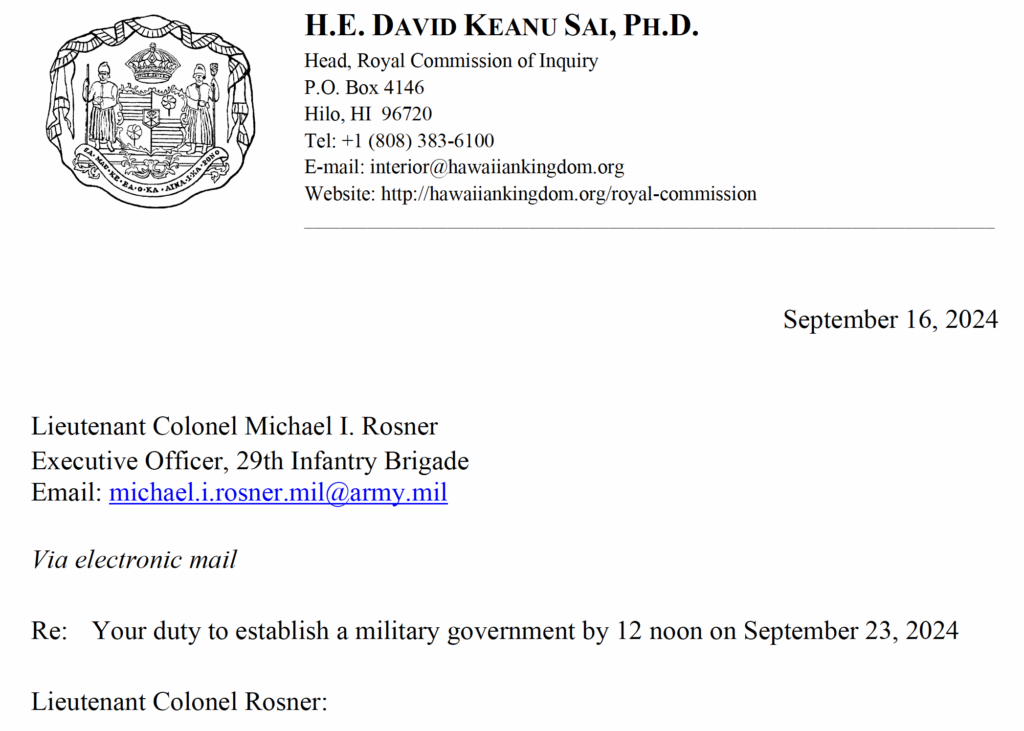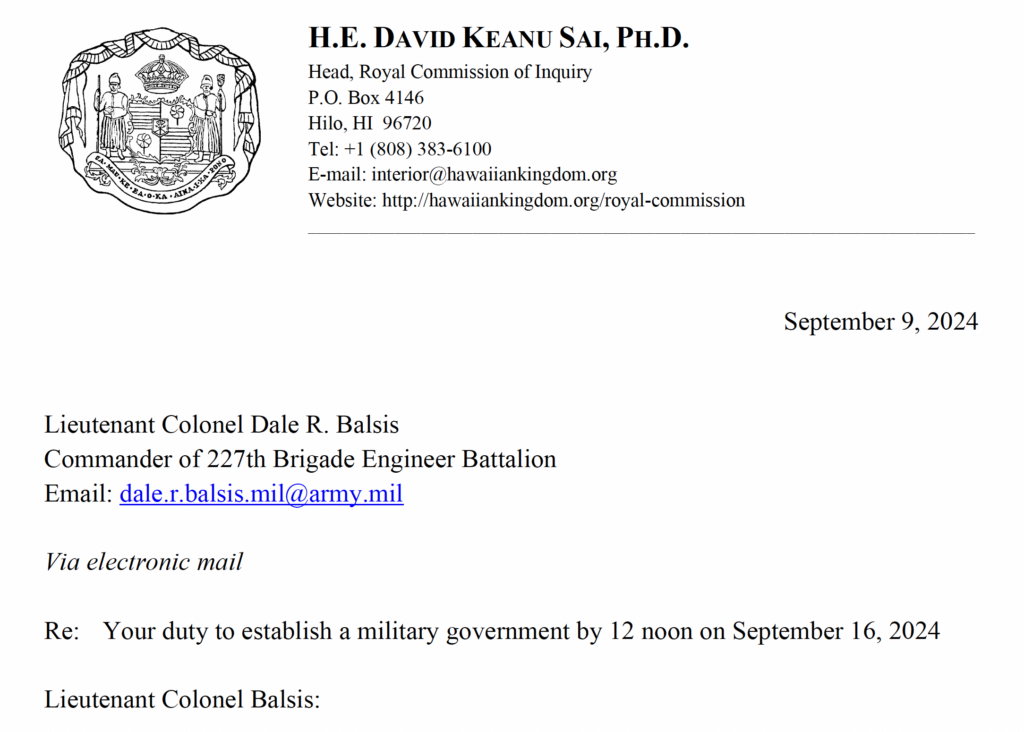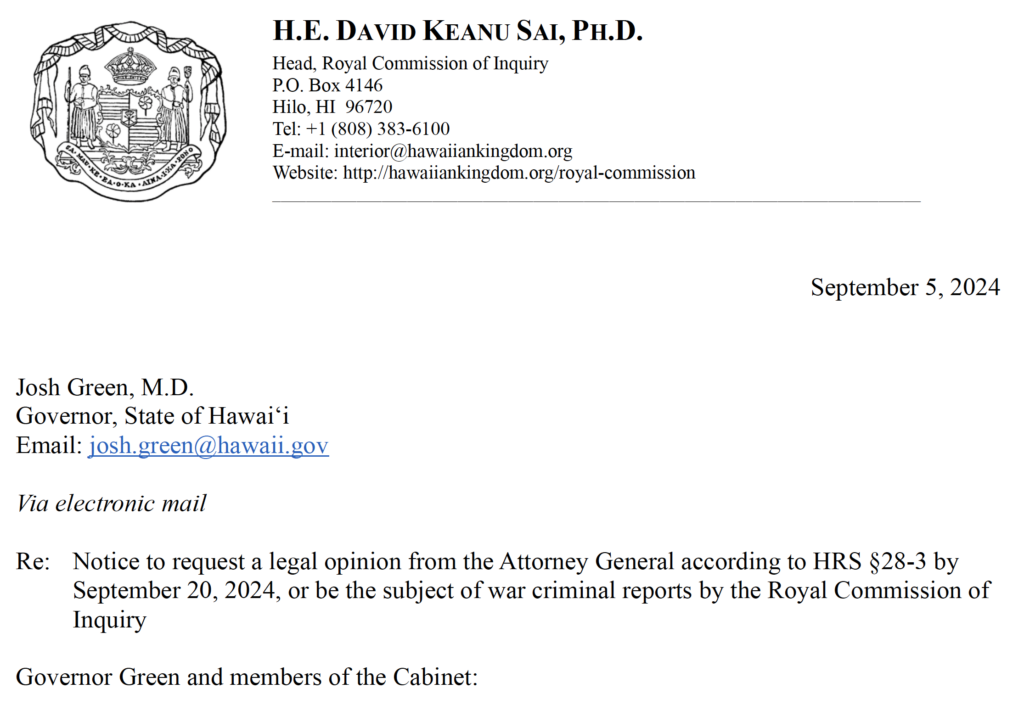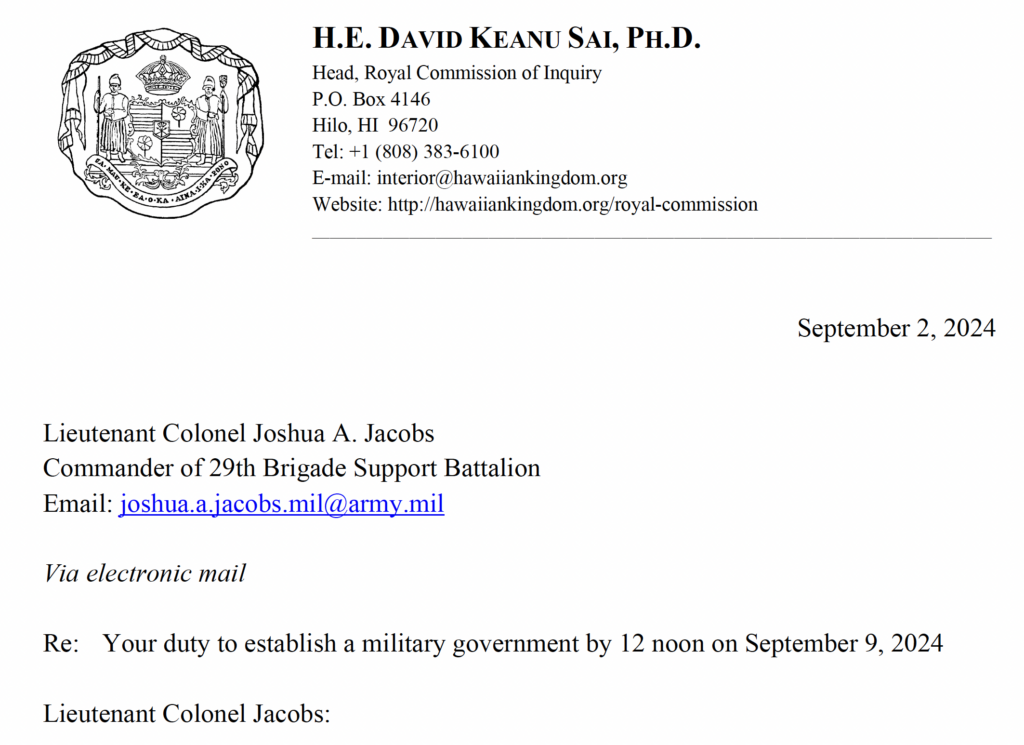Today, September 30, 2024, Dr. Keanu Sai, as Head of the Royal Commission of Inquiry, sent a letter to State of Hawai‘i Governor Josh Green, that he, Lieutenant Governor Sylvia Luke, Hawaiian Home Lands Chairman Kali Watson, and Deputy to the Chair Katie Lambert have been found guilty of the war crime of usurpation of sovereignty during military occupation, subject to criminal prosecution under War Criminal Report no. 23-0001-1. Here is a link to the letter.
On September 23, 2024, the Royal Commission of Inquiry notified “you and your Cabinet to cease and desist your functions under American municipal laws in light of Senator Cross Makani Crabbe’s formal request, pursuant to §28-3 Hawai‘i Revised Statutes, to Attorney General Anne Lopez for a legal opinion regarding whether the State of Hawai‘i is lawful and that the Hawaiian Kingdom does not continue to exist as an occupied State.”
In willful defiance of this order, on September 25, 2024, Kali Watson, Chairman of the Hawaiian Homes Commission and head of the Department of Hawaiian Homelands, delivered a NOTICE OF IMPOUNDING OF CATTLE LOCATED ON HAWAIIAN HOME LANDS, HUMU‘ULA, HAWAII TMK 39001009, 38001002, 38001007, 26018002 to Mr. Lawrence Costa, Jr., a Hawaiian subject. Therefore, Chairman Watson and Deputy to the Chair, Katie L. Lambert, as the principals of the war crime of usurpation of sovereignty during military occupation, and yourself, and Lieutenant Governor Sylvia Luke, as the accomplices, were made the subjects of the Royal Commission of Inquiry’s (“RCI”) War Criminal Report 23-00001-1. The RCI’s report provides the evidence necessary to meet the requisite elements of the war crime of usurpation of sovereignty during military occupation, and provides the probable cause that all four of you are guilty dolus directus in the first degree, and subject to prosecution. There are no statutes of limitation for war crimes.
The failure of Attorney General Lopez to provide a legal opinion, that the Hawaiian Kingdom ceases to exist as an occupied State and that the State of Hawai‘i is, therefore, within the territory of the United States, has consequently placed you, and members of your staff, with criminal culpability as war criminals. Surely, if the Hawaiian Kingdom does not exist as a State under international law, the Attorney General should have readily provided Chairman Watson a legal opinion that his action would be lawful.
Your Attorney General is confronted by insurmountable international law on the side of the Hawaiian Kingdom, and, consequently, creating a serious detriment to the State of Hawai‘i. The significance of the two legal opinions, by scholars of international law, demonstrate a significant difference from legal opinions written by attorneys at a national level. The latter is not a source of law, while the former is. Article 38 of the Statute of the International Court of Justice identifies five sources of international law: (a) treaties between States; (b) customary international law derived from the practice of States; (c) general principles of law recognized by civilized nations; and, as subsidiary means for the determination of rules of international law; (d) judicial decisions and the (e) writings of “the most highly qualified publicists (emphasis added).”
According to Professor Shaw, “[b]ecause of the lack of supreme authorities and institutions in the international legal order, the responsibility is all the greater upon publicists of the various nations to inject an element of coherence and order into the subject as well as to question the direction and purposes of the rules.” Therefore, “academic writings are regarded as law-determining agencies, dealing with the verification of alleged rules.” As the U.S. Supreme Court explained in the Paquette Habana case:
International law is part of our law, and must be ascertained and administered by the courts of justice of appropriate jurisdiction, as often as questions of right depending upon it are duly presented for their determination. For this purpose, where there is no treaty, and no controlling executive or legislative act or judicial decision, resort must be had to the customs and usages of civilized nations; and, as evidence of these, to the works of jurists and commentators, who by years of labor, research and experience, have made themselves peculiarly well acquainted with the subjects of which they treat. Such works are resorted to by judicial tribunals, not for the speculations of their authors concerning what the law ought to be, but for trustworthy evidence of what the law really is (emphasis added).
As a source of international law, the aforementioned legal opinions establish a shift in the burden of proof. The presumption of State continuity shifts the burden of proof as to what is to be proven and by whom to rebut this presumption. Like the presumption of innocence, the accused does not prove their innocence, but rather the prosecution must prove, beyond a reasonable doubt, that person’s guilt. Beyond a reasonable doubt means the evidence is so convincing that no reasonable person would have any doubts as to the person’s guilt. Likewise, the Hawaiian Kingdom need not prove its continued existence, but rather, the Attorney General must prove, beyond a reasonable doubt, that the Hawaiian Kingdom had been extinguished as a State under international law. This would make the State of Hawai‘i lawful.
In other words, the Attorney General’s legal opinion does not prove the State of Hawai‘i lawfully exists, but rather, it must prove, beyond any reasonable doubt, that the Hawaiian Kingdom does not exists, as a State, under the rules of international law as evidenced in the legal opinions by Professor Matthew Craven and Professor Federico Lenzerini. Evidence of a valid demonstration of legal title, or sovereignty, on the part of the United States would be an international treaty, particularly a peace treaty, whereby the Hawaiian Kingdom would have ceded its territory and sovereignty to the United States. Examples of foreign States ceding sovereign territory to the United States by a peace treaty include the 1848 Treaty of Peace, Friendship, Limits, and Settlement with the Republic of Mexico and the 1898 Treaty of Peace between the United States of America and the Kingdom of Spain.
There is no such treaty. There only exists a congressional joint resolution of annexation, purporting to have annexed a foreign State in 1898, which is an American municipal law limited in its effect to the territory of the United States. As the Department of Justice’s Office of Legal Counsel, stated in its 1988 legal opinion, “[i]t is unclear which constitutional power Congress exercised when it acquired Hawaii by joint resolution,” because “[t]here is a serious question whether Congress has the authority either to assert jurisdiction over an expanded territorial sea for purposes of international law or to assert the United States’s sovereignty over it.” This legal opinion also stated that “[o]nly by means of treaties […] can the relations between States be governed, for a legislative act is necessarily without extraterritorial force—confined in its operation to the territory of the State by whose legislature it is enacted.”
Absent the evidence of a treaty, the Hawaiian Kingdom continues to exist, as an occupied State with its sovereignty intact, despite the prolonged nature of the American occupation. Therefore, to restate paragraph 358, U.S. Army Field Manual 27-10, “military occupation confers upon the invading force the means of exercising control for the period of occupation. It does not transfer the sovereignty to the occupant, but simply the authority or power to exercise some of the rights of sovereignty (emphasis added).”
It should deeply concern the other members of your cabinet that the Attorney General has not relieved them of criminal culpability in the performance and functions under American law, by rebuking the legal opinions, as a recognized source of international law, of Professor Craven and Professor Lenzerini that conclude the Hawaiian Kingdom continues to exist. They should be equally concerned that the “Legal Opinion on War Crimes Related to the United States Occupation of the Hawaiian Kingdom since 17 January 1893” by renowned expert in international criminal law, Professor William Schabas, is also a recognized source of international law. In his opening paragraph, Professor Schabas recognizes the authority of the RCI and directly links his legal opinion to Professor Craven’s legal opinion on the continuity of the Hawaiian Kingdom.
This legal opinion is made at the request of the head of the Hawaiian Royal Commission of Inquiry, Dr. David Keanu Sai, in his letter of 28 May 2019, requesting of me “a legal opinion addressing the applicable international law, main facts and their related assessment, allegations of war crimes, and defining the material elements of the war crimes in order to identify mens rea and actus reus”. It is premised on the assumption that the Hawaiian Kingdom was occupied by the United States in 1893 and that it remained so since that time. Reference has been made to the expert report produced by Prof. Matthew Craven dealing with the legal status of Hawai‘i and the view that it has been and remains in a situation of belligerent occupation resulting in application of the relevant rules of international law, particularly those set out in the Hague Conventions of 1899 and 1907 and the fourth Geneva Convention of 1949. This legal opinion is confined to the definitions and application of international criminal law to a situation of occupation. The terms “Hawaiian Kingdom” and “Hawai‘i” are synonymous in this legal opinion.
Major General Hara’s failure to transform the State of Hawai‘i into a military government has denied all aboriginal Hawaiians—named Native Hawaiians today, of their legal right, under Hawaiian Kingdom law, as it was in 1893, to health care at no cost at Queen’s Hospital, and to access of government land at $.50 an acre. The inflation calculator has at $17.49 an acre today. As I stated in my letter to you and your cabinet, dated September 23, 2024, without a legal opinion by the Attorney General, Lieutenant Colonel Michael Rosner is duty bound to replace you, and become a military governor by transforming the State of Hawai‘i into a military government pursuant to U.S. Department of Defense Directive 5100.01, U.S. Army Field Manuals 27-5 and 27-10, and the Council of Regency’s Operational Plan to Transform the State of Hawai‘i into a Military Government. The operational plan has essential and implied tasks in accordance with Hawaiian Kingdom law and the Law of Armed Conflict, which is also known as international humanitarian law. Civilians of the occupying State have no place of authority in the territory of an occupied State.

